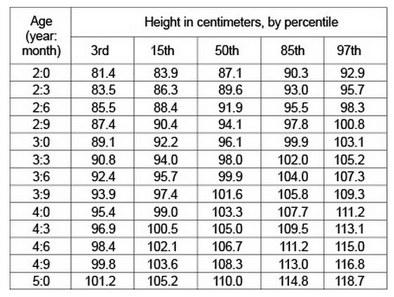题库 / GMATLA-MSR-37
Height-for-age
The World Health Organization (WHO) has produced a comprehensive set of growth standards for children. These standards are based on studies of children living in 6 nations on 5 continents under optimal conditions with respect to health and nutrition. The table displays the percentil distribution of height, in centimeters, at 3-month intervals, for boys ages 2 through 5 according to the WHO model. In a model population -- a large population of boys ages 2 through 5 that conforms to the WHO growth standards -- for n = 3, 15, 50, 85, and 97, nth percentile in height for a given age is the unique height among boys of that age that is greater than or equal to n percent, and less than or equal to (100- n) percent, of heights of boys of that age.

Weight-for-height
The graph shows the percentile distribution of weight, in kilograms, for heights from 80 cm to 120 cm, for boys ages 2 through 5, according to the WHO model. In a model population, for n = 3, 15, 50, 85, and 97, the nth percentile in weight for a given height is the unique weight among boys of that height that is greater than or equal to n percent, and less than or equal to (100 - n) percent, of weights of boys of that height.

For each of the following statements, select Yes if the statement must be true of a boy selected at random from a model population. Otherwise, select No
| Yes | No | |
|---|---|---|
|
|
|
If his age is greater than 3 years 3 months, the probability that his height is at least 98.0 cm is greater than 50%.
|
|
|
|
If he is at least 105 cm tall, the probability that his weight is 14.0 kg is no greater than 3%
|
|
|
|
If he is 114 cm tall, he is taller than at least 85% of boys his age.
|